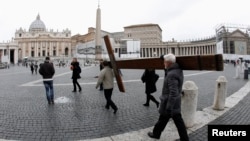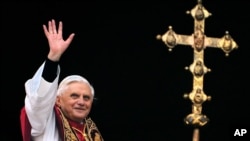ROME —
A leading dissident Austrian priest whose call to disobey some Roman Catholic teachings drew a rebuke from Pope Benedict XVI last year has urged Church leaders to throw off their secrecy and canvas churchgoers on who should lead them next.
Rev. Helmut Schueller, head of a group of priests who openly challenge Church positions on taboo topics, such as priestly celibacy and ordaining women, said selecting a successor to Benedict provides a chance to embrace public debate.
Schueller said his group represents 10 percent of Austria's clergy and enjoys broad public support for its pledge to break Church rules by giving communion to Protestants and divorced Catholics who remarry.
"If things were going well, the conclave fathers would at least be going out to the Church grassroots and calling meetings to really hear what the faithful expect,'' he told Reuters Wednesday in a phone interview.
"I find inappropriate this whole method that the cardinals withdraw into their own circle and something leaks out now and then about who might be under consideration,'' said Schueller, whose group is getting increasing attention abroad. "Most of the faithful know hardly anything about these people.''
(Source: Reuters)
While there are no official candidates, here are the "papabili,'' potential popes, most frequently mentioned recently. The list is in alphabetical order.
Some 117 cardinals will enter a closed-door conclave at the Vatican in mid-March to elect a successor to Benedict, who stunned the world's 1.2 billion Catholics on Monday by saying that he would step down on February 28.
There are no open campaigns or declared candidates for the post, and cardinals are forbidden by Church law from revealing for whom they voted. Many cardinals choose their favorite after a series of discreet contacts in the days before the election.
Coded language
One front-runner is Cardinal Christoph Schoenborn. Schueller was once his deputy in the Vienna archdiocese. His decision to debate with, rather than discipline, his dissident priests may count against Schoenborn among hard-line cardinals.
Schueller said such an important decision required all the time and effort needed to form a broad consensus rather than letting a small group of top leaders decide this in secret.
"A billion Catholics are listening to what is [being discussed] in entirely secretive, coded language,'' he complained, calling it undignified that the laity hear about the process only from journalists reporting from the Vatican.
"This passive waiting around is repugnant. It's really time, and commensurate with the dignity of the faithful, that [the cardinals] put their cards on the table,'' he said.
Reformist Austrian Catholics have for decades challenged the conservative policies of Benedict and his predecessor Pope John Paul II, creating protest movements and advocating changes that the Vatican firmly rejects.
Benedict, who for over two decades before his 2005 election was the Vatican's chief doctrinal enforcer, singled out the Austrian rebels for criticism last April while restating the church's ban on women priests.
The German-born pontiff said he would not put up with open revolt from clerics and lay people.
Vatican rules unchecked
Schueller said an outsider from Africa or Latin America would have his work cut out for him to take on Vatican insiders.
Two-thirds of today's Catholics live in Latin America, Africa and Asia, and Cardinal Peter Turkson of Ghana and Cardinal Odilo Scherer of Brazil are among those mentioned as candidates.
"The biggest problem is that the Vatican establishment rules are unchecked over the global Church. Any pope who takes this on has to be well positioned, has to act strategically and has to get lots of cooperation from the bishops of the world,'' he said.
Even support from a broad basis, however, might not be enough for a new pope to put his stamp on the Church, he said.
"What good are [such] authorizations for the pope if the system quickly takes him prisoner? This is coming out more and more in the analyses, and may have been a significant factor of the resignation'' of Benedict, he said.
Rev. Helmut Schueller, head of a group of priests who openly challenge Church positions on taboo topics, such as priestly celibacy and ordaining women, said selecting a successor to Benedict provides a chance to embrace public debate.
Schueller said his group represents 10 percent of Austria's clergy and enjoys broad public support for its pledge to break Church rules by giving communion to Protestants and divorced Catholics who remarry.
"If things were going well, the conclave fathers would at least be going out to the Church grassroots and calling meetings to really hear what the faithful expect,'' he told Reuters Wednesday in a phone interview.
"I find inappropriate this whole method that the cardinals withdraw into their own circle and something leaks out now and then about who might be under consideration,'' said Schueller, whose group is getting increasing attention abroad. "Most of the faithful know hardly anything about these people.''
Pope Frontrunners for Now
Pope Frontrunners for Now(Source: Reuters)
While there are no official candidates, here are the "papabili,'' potential popes, most frequently mentioned recently. The list is in alphabetical order.
- Joao Braz de Aviz (Brazil, 65) brought fresh air to the Vatican department for religious congregations when he took over in 2011. He supports the preference for the poor in Latin America's liberation theology, but not the excesses of its advocates.
- Timothy Dolan, (USA, 62) became the voice of U.S. Catholicism after being named archbishop of New York in 2009. His humour and dynamism have impressed the Vatican, where both are often missing.
- Marc Ouellet (Canada, 68) is effectively the Vatican's top staff director as head of the Congregation for Bishops. He once said becoming pope "would be a nightmare.''
- Gianfranco Ravasi (Italy, 70) has been Vatican culture minister since 2007 and represents the Church to the worlds of art, science, culture and even to atheists.
- Leonardo Sandri (Argentina, 69) is a "transatlantic'' figure born in Buenos Aires to Italian parents. He held the third-highest Vatican post as its chief of staff in 2000-2007.
- Odilo Pedro Scherer (Brazilia, 63) ranks as Latin America's strongest candidate. He's Archbishop of Sao Paolo, largest diocese in the largest Catholic country.
- Christoph Schoenborn (Austria, 67) is a former student of Pope Benedict with a pastoral touch the pontiff lacks. The Vienna archbishop has ranked as papal material since editing the Church catechism in the 1990s.
- Angelo Scola (Italy, 71) is archbishop of Milan, a springboard to the papacy, and is many Italians' bet to win. An expert on bioethics, he also knows Islam as head of a foundation to promote Muslim-Christian understanding.
- Luis Tagle (Philippines, 55) has a charisma often compared to that of the late Pope John Paul. He is also close to Pope Benedict after working with him at the International Theological Commission.
- Peter Turkson (Ghana, 64) is the top African candidate. Head of the Vatican justice and peace bureau, he is spokesman for the Church's social conscience and backs world financial reform.
There are no open campaigns or declared candidates for the post, and cardinals are forbidden by Church law from revealing for whom they voted. Many cardinals choose their favorite after a series of discreet contacts in the days before the election.
Coded language
One front-runner is Cardinal Christoph Schoenborn. Schueller was once his deputy in the Vienna archdiocese. His decision to debate with, rather than discipline, his dissident priests may count against Schoenborn among hard-line cardinals.
Schueller said such an important decision required all the time and effort needed to form a broad consensus rather than letting a small group of top leaders decide this in secret.
"A billion Catholics are listening to what is [being discussed] in entirely secretive, coded language,'' he complained, calling it undignified that the laity hear about the process only from journalists reporting from the Vatican.
"This passive waiting around is repugnant. It's really time, and commensurate with the dignity of the faithful, that [the cardinals] put their cards on the table,'' he said.
Reformist Austrian Catholics have for decades challenged the conservative policies of Benedict and his predecessor Pope John Paul II, creating protest movements and advocating changes that the Vatican firmly rejects.
Benedict, who for over two decades before his 2005 election was the Vatican's chief doctrinal enforcer, singled out the Austrian rebels for criticism last April while restating the church's ban on women priests.
The German-born pontiff said he would not put up with open revolt from clerics and lay people.
Vatican rules unchecked
Schueller said an outsider from Africa or Latin America would have his work cut out for him to take on Vatican insiders.
Two-thirds of today's Catholics live in Latin America, Africa and Asia, and Cardinal Peter Turkson of Ghana and Cardinal Odilo Scherer of Brazil are among those mentioned as candidates.
"The biggest problem is that the Vatican establishment rules are unchecked over the global Church. Any pope who takes this on has to be well positioned, has to act strategically and has to get lots of cooperation from the bishops of the world,'' he said.
Even support from a broad basis, however, might not be enough for a new pope to put his stamp on the Church, he said.
"What good are [such] authorizations for the pope if the system quickly takes him prisoner? This is coming out more and more in the analyses, and may have been a significant factor of the resignation'' of Benedict, he said.













